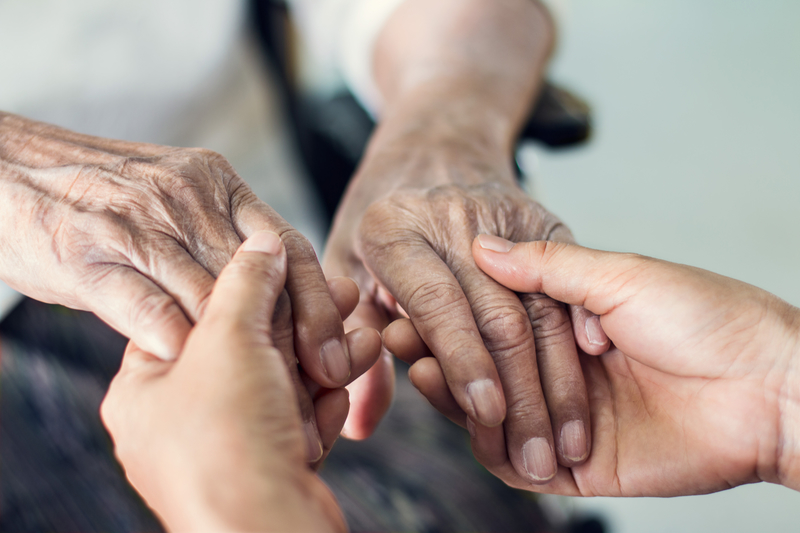If you have any questions about this post or any other related matters, please email me at lkayne@norris-law.com.
Five Things I Learned from My Father’s Illness

1. Emotional investment is different from a professional one.
I have been a Geriatric Social Worker for many years. A large part of my work with clients is helping them to plan for serious illness and supporting and advocating for them in hospitals and nursing homes. So, I certainly felt I was well-prepared to take on the challenges of my aging parents. And I was… until I wasn’t. When my 88-year-old father became ill and his health issues became serious, I struggled to maintain my professional demeanor. I truly learned firsthand how hard it is to make decisions when you are emotionally distraught. I am eternally grateful to my friends and colleagues who helped guide me.
2. Trust your gut.
My mother and I knew something was wrong with my father. He was slowly becoming more withdrawn and increasingly short of breath when he walked. We took him to multiple doctors, but his vital signs and bloodwork were normal, he “looked good” (whatever that means), and he was not able to say what was wrong, partially due to some cognitive impairment. Cardiac tests were scheduled in the fall due to difficulty getting an appointment. We thought many times about taking him to the emergency room, but he did not want to go, and we did not want to force him. Eventually, his condition declined to the point that he could not walk to the bathroom, and so after many weeks of indecision, he was finally sent to the emergency room.
3. Communication, communication, communication…
The emergency room is a marathon that is not for the faint of heart. Dad's gerontologist recommended he go through the ER rather than as a direct admission because he would get all the tests he needed more quickly, and that was the right call. I had followed my own professional advice and created a summary sheet for my dad that included his diagnoses, medications, medical history, and list of MDs and that was an extremely helpful document for all the MDs and RNs. After 8 hours of waiting (and freezing; why are ERs so cold?!!) he was preliminarily diagnosed with pulmonary emboli (blood clots in his lungs), placed on an IV blood thinner, and admitted. The next few days I went to the hospital early (the best way to communicate directly with the medical staff) and reviewed all his medical information, including his cognitive impairment, and felt comfortable that we were all on the same page. Further testing revealed that he did not have emboli and his cardiologist diagnosed him with congestive heart failure (CHF). He was switched to IV Lasix for a few days with some minor improvement in his breathing. Despite his expressed desire to go home, the plan was for him to remain a few more days until his breathing was more stable and he had some physical therapy. The next day there was a new RN, a new MD, and his cardiologist went on vacation, and he was discharged at 6 PM with no warning. The new medical staff did not have a full picture of the situation despite our best efforts to keep everyone informed. The MD said he had mild CHF and was fine, although she agreed to cancel the discharge if we really pushed. Despite our strong misgivings, we took him home.
4. Don’t be afraid to be the bad guy.
We knew my dad was not fine. His breathing was not normal and he had only one session of PT. The mild CHF diagnosis did not fully explain his symptoms. He, however, was desperate to go home and we did not want to upset him by insisting that he stay. By the next afternoon, his breathing was much worse and he allowed me to call 911. He stopped breathing in the living room, but was successfully resuscitated by the EMTs. He stopped breathing again in the ER, so we agreed to place him on a respirator because we didn’t know what was wrong and didn’t know if it was reversible. As his body systems all began to fail, and even more invasive treatment was needed, we had to decide how much more to put him through. We had discussions in the past about his wishes for the end of his life and knew he would not want to live dependent on machines. As a family, we gathered by his bedside and were with him when the respirator was removed and when he passed away.
5. You can’t be a Monday morning quarterback.
I don’t know what was wrong with my dad or why he died. It’s very hard not to look back and think that if we had insisted that he stay in the hospital, they might have correctly diagnosed him and fixed the problem. Or, if we had been told he was coming to the end of his life and there was no treatment, we would have allowed him to die peacefully at home and not called 911. Ultimately, we will all have to allow ourselves to accept that we made the best decisions we could with the information we had. I’m still working on that….



